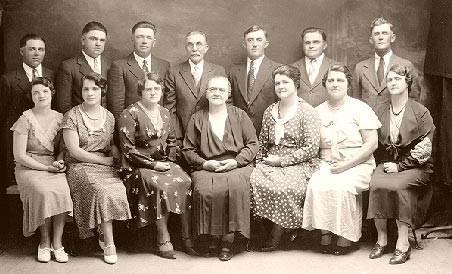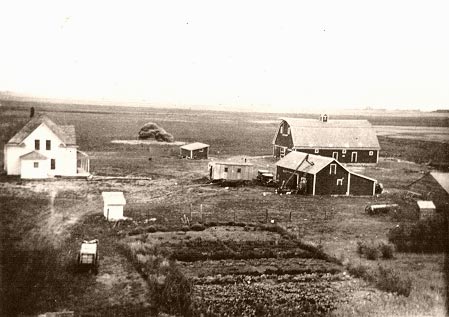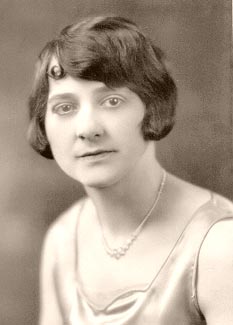In honor of the ethnic heritage and family traditions and values represented by Simon Rudel and Dorothea Weber Rudel, their daughter Marie Rudel Portner established an endowment in 2000 to support continued preservation and study of the Germans from Russia culture and heritage.

Simon Rudel made a bold decision in great courage of faith as did his grandfather Wilhelm Rudel fifty years earlier.
The Rudel family traces roots to Wuerttemberg region of Germany, speaking Swabish dialect. Jacob and Johanna Rudel, married in 1795, nurtured a first son Wilhelm. Although born in Wuerttemberg, Wilhelm and his wife Johanna in 1829 joined the second immigrant wave to Arzis, Bessarabia in the Budschak region--attracted by expanded colonist privileges from Czar Alexander II, the grandson of Czarina Catherine II, the Great.
Wilhelm's only son Friedrich and his wife Wilhelmina prospered with fourteen children. Their sixth child was Simon. Simon Rudel lived in Alt-Arciz, one of two major marketing/auction trade villages in Bessarabia, when the special colonist privileges of perpetuity were canceled and devalued to general citizenship in 1871-1874. Young Simon immigrated with the promise and hope for a future in America.

On February 17th, 1882, Simon married another Bessarabian immigrant, Dorothea Weber in Scotland, South Dakota. In March 1893, they arrived at the Sykeston land office where the Soo Railway track construction had ended. Their wagon journey to Fessenden was much hindered by heavy snow and spring melt, according to family oral memory. Simon and Dorothea established homestead for agricultural farming in Oshkosh Township, Wells County, North Dakota. That first year, with their older six children, they lived in a sod house. Within a year, they built a permanent wood-frame house. Six more children were born at this farmstead, five miles east of Fessenden, North Dakota.
The Rudel family were active, devout German Baptists, where Simon was involved in the incorporation of the rural German Baptist Church of Germantown, in 1902.
Simon Rudel and five sons continued to acquire farmland to accumulate over 5,000 acres, including Simon and Dorothea's four daughters marrying local Bessarabian German families of Pepple (historically Böppel), Beuchler, and Kessler at Cathay, North Dakota.
Beginning in 1920, Simon and Dorothea Rudel retired for twenty years in Spokane, Washington, to continue close social contact with other Bessarabian immigrants who settled that region. In 1932, Simon and Dorothea celebrated their Golden Wedding Anniversary at the First German Baptist Church in Fessenden.
During 1936-1937, Simon wrote family letters in Swabian German text to his son Herbert Rudel, still farming the family homestead near Fessenden. Some of these letters have survived intact, and they are displayed with some English text, translated by grandson Weston Rudel. After a century, the Rudel Family and their descendants are a rare centennial family to remain well-represented in Fessenden and rural Wells County.
In honor of the ethnic heritage and family traditions and values represented by Simon Rudel and Dorothea Weber Rudel, their daughter Marie Magdalena Rudel Portner established an endowment trust to support continuing preservation and study of the Germans from Russia culture and heritage.

Marie Magdalena Rudel (1897-1999) was the eighth of twelve children, born at Fessenden, North Dakota. She also had distinction for being the longest surviving graduate of rural Oshkosh School District (1913), Fessenden High School (1917), and Valley City State Teacher's College (state normal school of 1919). As a certified elementary educator, Marie taught at West Norway Township, Wellsburg, and Heimdal,before relocating in 1920 with her retiring parents to Spokane, Washington.
After marrying Hal Portner of Spokane, Washington, where she continued in public education, Marie continued her married life in Alhambra, California, and Las Vegas, Nevada. Hal's vocational career, as city and county electrical and plumbing codes inspector, evolved into land investment/development of prime Las Vegas Boulevard properties for twenty years. Hal and Marie were identified with improved community leadership and community philanthropy, before Marie was widowed for twenty-five years.
Marie reminisced in 1997 with memories of her Christian baptism in the James River, herding sheep with her sister Hilda, and teaching in rural school houses where chalkboards were simply plaster walls painted black.
Through these years as eighth of twelve Rudel children, Marie exemplified moral strength, humorous wit, and focused determination, which characterized many ethnic Germans from Russia settlers with other early pioneers of the Northern Plains and Dakota Prairies.
Text prepared by Jay Gage, exhibits and textiles curator, Germans from Russia Heritage Collection, NDSU Libraries, Fargo.
Marie Rudel Portner Links
- Germans from Russia Program to receive $1.1 million gift
- Obituary of Marie Magdeline (Rudel) Portner - 1897 - 1999
- Dedication of the Marie Rudel Portner Germans from Russia Room & the Announcement of the Marie Rudel Portner Endowment for the Germans from Russia Heritage Collection
- Early Rudel Family History: 1125 AD to 1440 AD
- Fessenden Woman Plans Major Bequest to NDSU Libraries and Germans from Russia Heritage Collection (May 1, 1997)
- 99-Year-Old Fessenden Native Contributes Third $10,000 Gift to Germans from Russia Fund at NDSU Libraries
